Sometimes, philosophy and religion seem like distant cousins at a family reunion, occasionally acknowledging each other’s presence but often leading separate conversations.
Philosophy and religion can be likened to distant relatives at a family gathering, occasionally acknowledging each other but mostly engaging in separate discussions.
Many intellectuals throughout history have outright rejected the concept of a higher power. Some people not only believe in a divine figure but also construct complete belief systems based on it. Renowned philosophers have grappled with the timeless inquiry over the existence of God and its implications for humanity.
Throughout history, philosophers have examined this subject comprehensively, spanning from ancient Greece to the present day. Each perspective offers a unique flavour, enriching our understanding with a variety of viewpoints. Consider Plato as an example. He maintained that the universe originated from a divine creator and believed that philosophy was the key to comprehending this divine concept. His ideas spread rapidly and significantly influenced the thinking of philosophers for centuries.
Descartes then presented his perspective. He expressed the belief that the existence of consciousness and thought implies the existence of a higher power. The ontological argument has been stirring debate in philosophical circles since its inception. Even in contemporary times, philosophers continue to explore the concept of God and seek to understand its significance.
Prepare yourself! We are going to explore the philosophical perspectives on religion of 10 different philosophers.
Plato
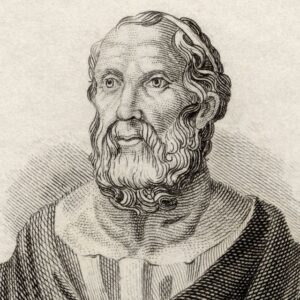
Plato isn’t just some old philosopher gathering dust in the history books; he’s a big deal. You know, the kind of guy who made waves in ethics, politics, and metaphysics. But what really sets him apart is his whole divine thing. Plato was all about the sacred, and it colored everything he did.
He had this wild idea that there was a higher reality out there, something he called the Theory of Forms. According to him, our world is just a cheap knockoff of this better reality.
Plato also had some thoughts about us humans. He figured we’ve got a little bit of divine sparkle in us, with immortal souls capable of grasping these Forms or Ideas he was on about. And get this: Plato thought the whole point of being alive was to get wise to these Forms and become a bit more divine ourselves.
Let’s not forget about his Demiurge concept. It is like to a cosmic handyman overseeing the entire process of creation, growth, and annihilation in the cosmos. It may not be the most efficient tool, but it is effective.
Plato’s philosophy revolves around perceiving the world as a reflection of a greater and superior reality. His thoughts have had a significant impact on Western philosophy and continue to generate discussions to this day.
René Descartes

René Descartes, a French thinker from back in the day (1596-1650), wasn’t just some run-of-the-mill philosopher. He wore many hats – philosopher, mathematician, and scientist – and left a big mark on Western philosophy.
Now, Descartes was a firm believer in God, and he wasn’t shy about it. He laid out his arguments for God’s existence in his famous work, “Meditations on First Philosophy.” In these meditations, he threw down several arguments, but two really stand out.
First up, we’ve got the ontological argument. Descartes basically said, “Hey, just think about it: if we’re talking about God, we’re talking about the most perfect being imaginable. And if something’s perfect, it’s gotta exist, right?” It’s like saying the idea of a perfect pizza automatically includes the pizza actually existing in real life.
Then there’s the cosmological argument. Descartes looked at the universe and said, “Somebody had to kickstart this whole thing, and who better than God?” It’s like saying every effect has to have a cause, and God’s the cause behind the whole shebang.
But hold your horses! Descartes wasn’t all about blind faith. He was big on reason and doubt, urging folks to question everything they thought they knew. He reckoned we should only believe stuff that’s certain and beyond a shadow of a doubt.
Immanuel Kant
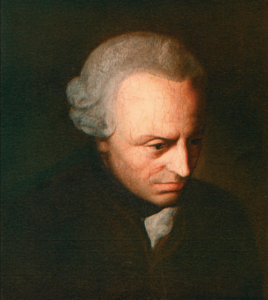
Immanuel Kant, a German philosopher from the 18th century (1724-1804), wasn’t your average deep thinker. He’s famous for his moral philosophy, and at the heart of it all is something he called the “Categorical Imperative.”
Kant believed that when it comes to morality, there’s this supreme principle that’s like a guiding light for practical reason. He called it the Categorical Imperative. According to him, this moral law isn’t just some hocus pocus; it’s a truth that’s hardwired into our very nature. So, when you’re wondering what you should do, Kant says, “Just use your noggin and act in a way that follows this universal moral law.”
Kant also expressed his views on God and morality. He contended that morality and God are closely connected. If you desire morality to be objective, meaning a system of laws that are universally applicable, then it is necessary to incorporate God. Kant believed that moral ideals and duties lack a stable basis in the absence of God.
Kant’s moral argument for God states that moral values are objective. Objectivity requires the support of God. Hence, God exists. Kant’s argument has generated extensive debate among philosophers. Some argue that it is flawed, resembling Swiss cheese, while others assert that it provides a strong rationale for believing in God.
All in all, Kant’s take on the relationship between morality and God is a big deal in the world of philosophy and religion.
William James

William James, an American thinker who lived from 1842 to 1910, was different from your typical philosopher. He dabbled in both philosophy and psychology, making waves in the world of pragmatism and the study of religious experiences.
Now, James had this radical idea that the truth of an idea shouldn’t just be judged by how well it lines up with reality but by what kind of impact it has on our lives. He called this approach pragmatism, and it’s all about focusing on the practical consequences of our beliefs rather than their correspondence to some objective truth.
As for God, James was all about believing in believing. He didn’t think you needed ironclad evidence or fancy arguments to justify believing in God. Nope, for James, the key was in the practical value of that belief.
In his essay “The Will to Believe,“ James made the case that sometimes, it’s perfectly reasonable to believe in something even if you don’t have hard evidence for it. If that belief is important to you and it can’t be proven or disproven, why not embrace it?
James called his take on theism pragmatic theism. He reckoned that believing in God wasn’t just about whether it’s true or not but about the ways it enriches our lives. According to James, belief in God offers comfort, meaning, and a sense of direction. And hey, what really matters in the end?
Gottfried Wilhelm Leibniz
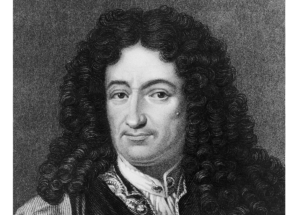
Gottfried Wilhelm Leibniz, a German thinker from back in the day (1646-1716), wasn’t just your average Joe. He was a true Renaissance man, dipping his toes into a whole bunch of fields like metaphysics, math, and even geology.
Now, Leibniz is probably best known for his beef with Sir Isaac Newton over who came up with calculus first. Yeah, it was a whole thing known as the Leibniz-Newton calculus controversy. These two were like the original rivals in the math world.
However, let’s discuss religion. Leibniz focused on God and proposed that reality consisted of spiritual entities known as “monads.”He was renowned for his optimism, asserting that despite its imperfections, our planet is the most ideal creation by God. However, this perspective received criticism from individuals such as Voltaire, who ridiculed it in his work “Candide.”
Leibniz’s optimism was based on his conviction that God is entirely benevolent and that all events, including negative ones, are intricately connected to a superior design. He believed that evil and suffering, despite their harshness, serve a higher purpose in the overall plan of existence.
Leibniz may have held contrasting views with Newton, yet he expressed positive beliefs regarding God and the purpose of life.
Antony Flew
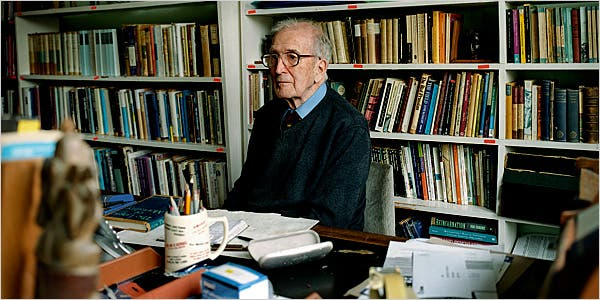
Antony Flew, an English philosopher known for his staunch atheism, made headlines when he switched gears and embraced deism later in life.
In 2007, he teamed up with Roy Abraham Varghese to pen “There is a God: How the World’s Most Notorious Atheist Changed His Mind,“ a book that detailed his journey from atheism to deism.
Born in 1923 to a Methodist minister, Flew had a religious upbringing but grew disillusioned with it as he got older. By the time he was a teenager, he’d already soured on the traditional Christian idea of a benevolent God.
Flew’s change of heart stirred up quite a storm in philosophical circles. He argued that the intricacies of the universe and the existence of life couldn’t be chalked up to natural explanations alone, pointing to the need for a higher power.
But even with his change in belief, Flew didn’t cozy up to organized religion. He wasn’t buying into the whole personal God thing that Christianity peddled. In 2010, at the age of 87, he passed away, leaving behind a legacy of debate and contemplation.
Søren Kierkegaard
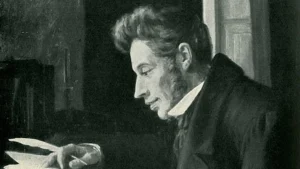
Søren Kierkegaard, a Danish thinker from the 19th century, is often hailed as the pioneer of existentialism. He wasn’t just a philosopher; he was a jack-of-all-trades, dabbling in theology, writing, psychology, and more.
Kierkegaard was deeply rooted in his Christian faith, seeing it as the cornerstone of human existence. He believed that faith wasn’t about logic or proof but about taking a leap of faith and fully committing to God.
His philosophy put a spotlight on personal experience and individual choice. According to him, faith wasn’t something you inherited or adopted because of tradition; it was a deeply personal decision that each person had to make for themselves. Kierkegaard wasn’t too keen on the established church, which he saw as too focused on rules and tradition rather than fostering a genuine connection with God.
Even though Kierkegaard ruffled some feathers with his critiques of the church, his ideas about faith and individual choice still hold weight today. People are still dissecting his work, interpreting it in different ways, and debating its implications. Despite his criticisms, Kierkegaard remains a significant figure in Christian thought and theology.
William Lane Craig

William Lane Craig is an outstanding parent in cutting-edge Christian philosophy, especially in the realms of philosophy of religion and apologetics. Currently conserving the position of Research Professor of Philosophy at Talbot School of Theology in California, Craig has left his mark on the sector with over 30 books to his call, along with titles like “Reasonable Faith: Christian Truth and Apologetics“ and “God Is Great, God Is Good: Why Believing in God Is Reasonable and Responsible.“
His reputation largely stems from his paintings on the Kalam cosmological argument, a modern take on the age-old cosmological argument for God’s existence. Craig has vigorously defended this argument in debates and publications, putting forward that the universe had a starting due to a transcendent, private Creator.
Craig has advocated the ethical argument for God’s existence, asserting that purposes, ethical ideals, and obligations are entirely rooted in God’s character.
Craig’s insights have significantly impacted Christian apologetics, playing a crucial role in revitalising philosophical interest in theism in modern times. His staunch advocacy for Christian principles has positioned him as a prominent figure in the field, igniting global debates and conversations.
Charles Sanders Peirce

Charles Sanders Peirce, an American truth seeker, philosopher, and scientist, is hailed as one of the founding figures of American pragmatism. His influence also extends to the field of semiotics, which examines signs and emblems and how they may be used and interpreted.
Peirce became a company believer that the universe operated under discoverable legal guidelines, which he saw as evidence of divine intelligence in paintings.
His philosophy was deeply intertwined with his perception of God, which he took into consideration not only the simplest rationale but also crucial. According to Peirce, God became the architect of the universe, and the very laws of nature had been a testament to His lifestyle. Peirce also posited that human beings had a unique bond with God, rooted in our potential for purpose and knowledge.
Peirce’s pragmatism positioned a top class on movement and experience in determining the facts of thoughts. He argued that the practical effects of a concept were key to its validity and that the means of an idea were formed via its practical application. This pragmatic technique left an indelible mark on American philosophy, influencing the works of various luminaries, including William James and John Dewey.
Alvin Plantinga
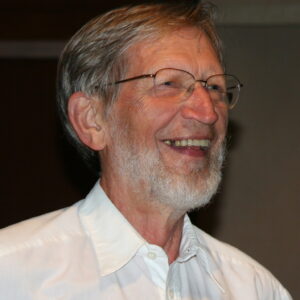
Alvin Plantinga, an American analytic philosopher, has made significant contributions to the philosophy of religion, particularly in tackling the problem of evil.
His defense is a contemporary response to the logical problem of evil, which contends that the existence of evil is incompatible with the existence of an all-powerful, all-knowing, and all-good God. Plantinga’s argument posits that it’s feasible for God and evil to coexist if God has a morally justifiable reason for allowing evil.
One such reason, according to Plantinga, is the existence of free will. He asserts that God can’t create a world where humans possess free will and simultaneously prevent all instances of evil. In other words, allowing free will inherently opens the door to the possibility of evil.
Conclusion
The perennial dilemma of whether or not God exists has long occupied thinkers. Others made strong cases for the existence of a divine hand, while some flat-out denied the idea.
Thomas Aquinas and other sincere Christians were among them, as were philosophers and rationalizers who pondered the presence of God. However, as of yet, no one has provided conclusive evidence of God’s existence, and such evidence may never come to light. However, philosophical discussions around this subject are inherently interesting and frequently prompt introspection.
In the future, we expect philosophers to keep exploring the possibility of a higher power or the existence of God.
The existence of God is an unanswered question; that much is certain. Not only will philosophers think about it for a long time, but the general public will as well.
